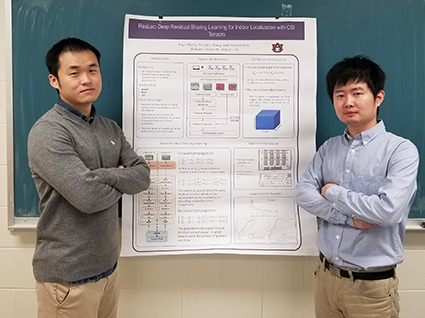Electrical and Computer Engineering students earn Best Student Paper Award
Xuyu Wang and Xiangyu Wang, graduate students in the Department of Electrical and Computer Engineering, won a Best Student Paper Award at the Institute of Electrical and Electronics Engineers International Symposium on Personal, Indoor and Mobile Radio Communications.
 |
| Xiangyu Wang (left) and Xuyu Wang |
Four awardees were selected from approximately 500 accepted papers presented at the international wireless conference held in Montreal in October.
“This prestigious award is a well-deserved reward to Xuyu and Xiangyu for their hard work and dedication,” said Shiwen Mao, Samuel Ginn Professor and director of the Wireless Engineering Research and Education Center. “We are fortunate to have such brilliant students who bring recognition to Auburn’s wireless engineering program.”
The paper, titled “ResLoc: Deep Residual Sharing Learning for Indoor Localization with CSI Tensors,” applies a machine learning technique known as deep residual learning to locating a mobile device in an indoor environment.
“The idea is to detect the wireless channel features experienced by received data packets, or Channel State Information, which is indicative of the physical location of the device,” said Mao, the students’ faculty advisor. “Although this challenging problem has been investigated in prior work, our research uses bi-modal CSI data in the form of tensors and the application of the deep residual learning technique to process the CSI tensors.”
Mao said they are advancing the field with a new deep residual sharing learning algorithm, which includes two parallel channels that share their residual signals at intermediate blocks.
“The new technique is implemented with commodity Wi-Fi so no extra hardware is needed, and it is tested with extensive experiments. It achieves superior location accuracy when compared with the state-of-the-art schemes,” he said.
“It is a great honor to receive the award,” Xuyu Wang said. “We hope the new deep residual sharing learning technique proposed in this paper will be applied to solve many other machine learning problems.”
- Written by Carol Nelson
Media Contact: , chris.anthony@auburn.edu, 334.844.3447
Xiangyu Wang and Xuyu Wang

